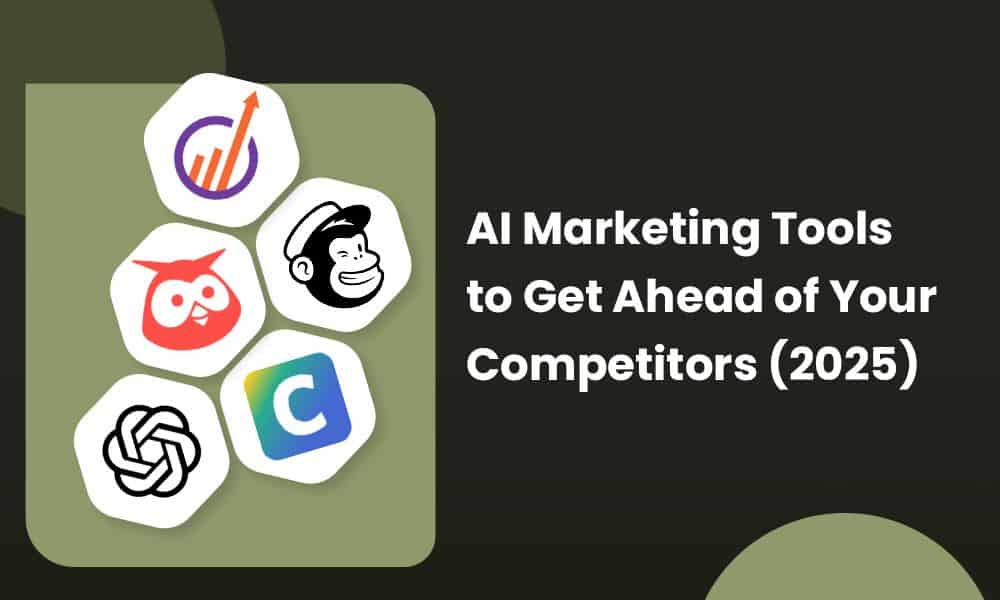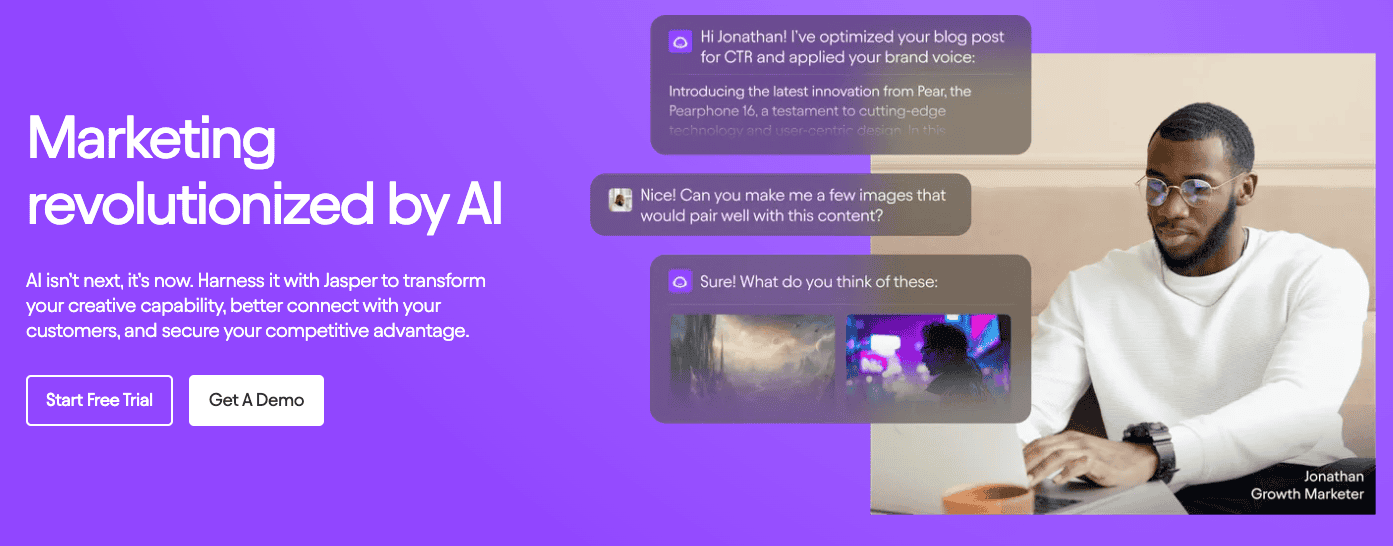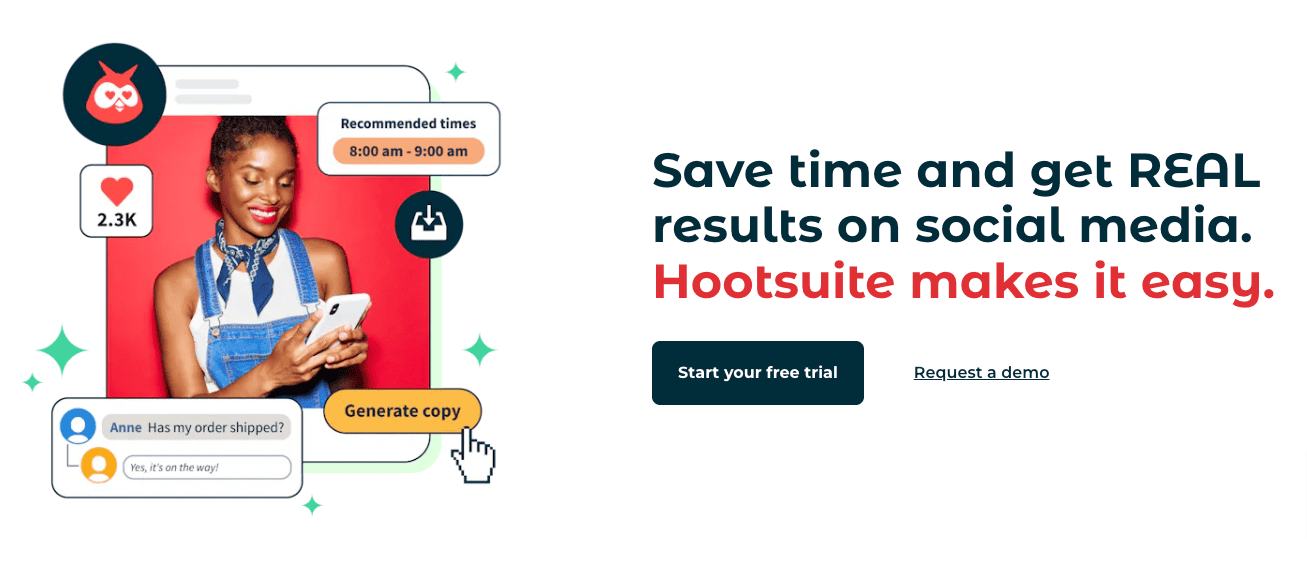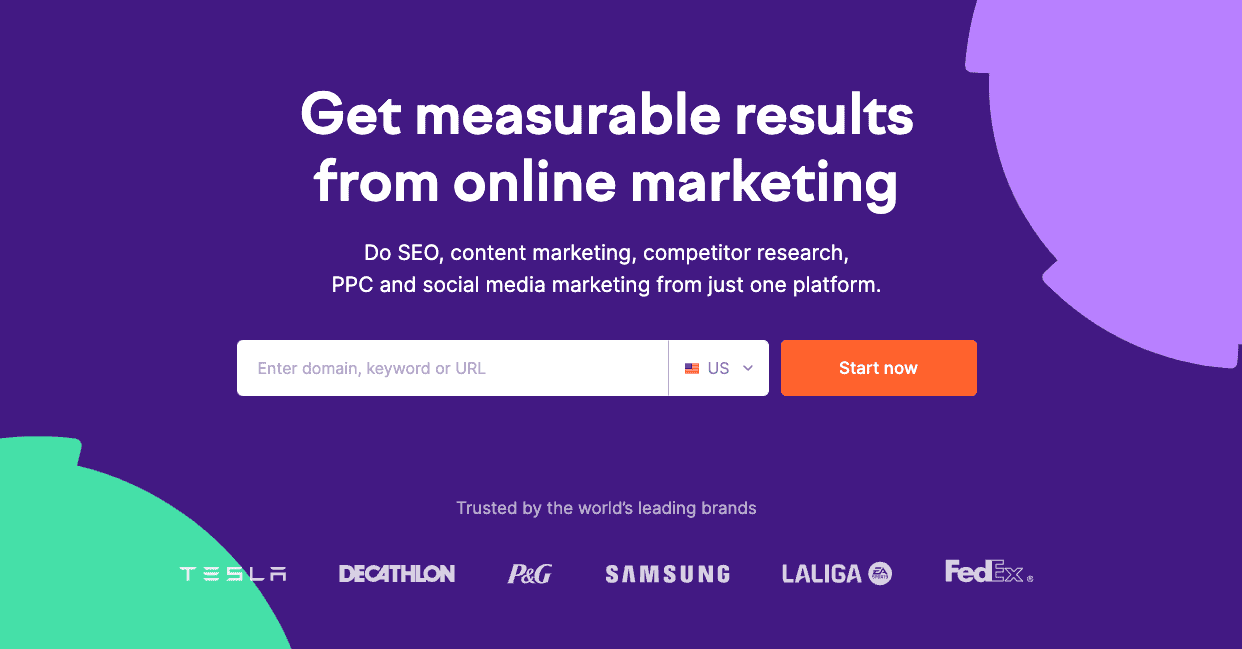Need a robot to handle those repetitive tasks and lighten your workload?
The answer lies in artificial intelligence. Marketers worldwide have embraced AI because it helps businesses scale rapidly. AI has revolutionized the industry by reducing workloads, cutting costs, and saving time.
AI plays a crucial role in marketing, developing content strategies, creating content, and analyzing performance. This surge in demand has led to the emergence of numerous high-performing AI marketing tools.
Worried about the cost? It’s certainly less than what you’ll save.
Still skeptical?
Let’s dive into how AI has transformed the marketing industry. In this blog post, we’ll examine the difference between traditional and AI marketing tools, the different platforms, and examples of brands that successfully utilized these tools.
Read on to discover more!
Table of Contents
Key Takeaways
- Enhanced productivity and efficiency: Embracing AI marketing tools can significantly reduce workload, cut costs, and save considerable time, benefiting small businesses by enhancing productivity and efficiency.
- Advanced technologies: AI marketing tools leverage machine learning and data analytics to perform various marketing tasks, including content creation, analysis, and optimization.
- Optimized targeting strategies: AI-powered predictive analytics enables small businesses to optimize targeting strategies, allocate resources effectively, and improve return on investment (ROI) from marketing campaigns.
- Personalized marketing: Personalization is key in modern marketing, and AI enables small businesses to deliver personalized communications and individualized interactions to their customers, leading to higher engagement and retention rates.
- Choosing the right tools: When selecting AI marketing tools, small businesses should consider features, integration capabilities, ease of use, and support to ensure they choose the right solution aligned with their goals and resources.
Understanding AI Marketing Tools
AI marketing tools are software programs that leverage artificial intelligence technologies, such as machine learning and data analytics, to perform specific marketing tasks.
These tasks include keyword planning through NLPs, content planning, outlining, competitor research, content creation, proofreading and editing, and other marketing operations.
These tools use the power of generative AI to solve research problems while writing marketing pieces, maintain a seamless flow in your writing, spot errors, and improve readability.
The benefits of employing an AI marketing tool are manifold, but the question remains: are you ready? While using AI may be easy to learn, it is crucial to use it ethically in your marketing efforts.
There are many AI use cases where marketers have indiscriminately used AI-generated content to rank on search engine result pages, neglecting the long-term impact on their domain authority. So, the question remains: are you ready for AI?
Read also: Unlocking Efficiency — Top AI Tools for Small Businesses
AI Marketing Tools vs Traditional Marketing Software
Traditional marketing has proven effective and resonates with people, so it remains highly successful.
With the advent of AI, these marketing models are not threatened but enhanced. AI marketing tools support existing marketing strategies by handling mundane tasks, analyzing crucial data, and saving time.
Machine-learning-powered analytics algorithms organize, analyze, and accurately determine the value of information, enabling marketers to make well-informed, real-time decisions that can significantly impact their company’s bottom line.
Thanks to AI, marketers can devote more time to creative and critical thinking.
Due to AI and automation, tasks like manually entering data into complex spreadsheets, creating extensive charts and analyses, and establishing email and social media marketing plans have become easier and less time-consuming.
Read also: The Best AI Tools for Business to Boost Efficiency
Benefits of AI Marketing Tools for Small Businesses

Enhanced customer insights
AI-powered analytics software can quickly handle massive volumes of data, revealing significant insights into customer trends, market patterns, and operational efficiencies. AI excels at processing vast amounts of data and generating actionable insights.
AI-powered analytics solutions can evaluate various datasets, giving small businesses valuable insights into customer behavior, market trends, and operational performance.
To deepen these gains, consider tools that turn unstructured customer feedback into scalable AI insights and analytics. These systems automatically read reviews, NPS comments, and survey responses, classifying themes, detecting sentiment shifts, and highlighting drivers of delight or churn.
Marketing and CX teams can route issues to owners, prioritize fixes, and validate campaign impact with real voice-of-the-customer data—at scale. This closes the loop faster and helps small businesses refine messaging, improve product-market fit, and increase retention.
This data-driven approach enables informed decision-making, identifies growth opportunities, and fine-tunes strategies for improved outcomes.
Small businesses that use AI for data analysis can gain a competitive advantage by staying agile and responsive to market developments.
Improved ROI
Predictive analytics can dramatically boost your return on investment (ROI) from marketing campaigns.
AI-driven marketing tools forecast consumer behavior, optimizing targeting strategies and resource allocation. This precision ensures efficient utilization of resources, resulting in higher conversion rates and increased revenue.
With predictive analytics, small businesses gain a competitive edge by making informed decisions and maximizing the effectiveness of their marketing efforts.
Personalization for customer engagement
By providing personalized communications and individualized interactions, AI also improves consumer engagement.
Businesses can obtain insights into their customers’ tastes, activities, and purchasing patterns by utilizing AI-driven analytics.
Using this data, AI can personalize customer support conversations, recommendations, and marketing efforts. Businesses can boost engagement and build stronger client relationships by providing individualized experiences. This could lead to higher retention rates and, ultimately, higher sales.
Efficiency in marketing operations and cost reduction
Using AI in small enterprises often reduces costs and increases productivity. Businesses save time and reduce manual labor costs by automating repetitive tasks such as data entry, customer service, and inventory management.
This is particularly beneficial for financial management, where AI can help avoid errors, reduce overhead costs by automating invoicing, track expenses, and streamline financial processes.
AI-powered predictive analytics also minimizes waste, improves resource allocation, and streamlines operations like supply chain logistics and inventory management.
Read also: 11 AI Lead Generation Tools to Acquire Leads 10X Faster
The Different Types of AI Marketing Tools
Explore how AI-powered tools can transform various aspects of your marketing strategy, from content creation to customer relationship management.
Content creation and curation tools
While they can’t replace you, AI-powered content production tools can significantly enhance your content creation efforts. These tools use generative AI technology to produce text-based or visual material in response to written prompts.
AI tools for content generation can automate many repetitive tasks, such as updating graphics for brand templates, paraphrasing content for different marketing channels, resizing images to fit platform standards, and more. This allows you to create more content efficiently and maintain consistency across various marketing channels.
ChatGPT, JasperAI, and AISEO are popular examples of AI content creation tools that can be used to write amazing content for social media captions, SEO, and many other platforms. AI tools such as DALL-E, MidJourney, and Canva are adept at generating images for various marketing purposes.
To effectively leverage these powerful generative AI tools, marketers can benefit greatly from dedicated generative AI courses that teach practical application and strategy.
Email marketing automation
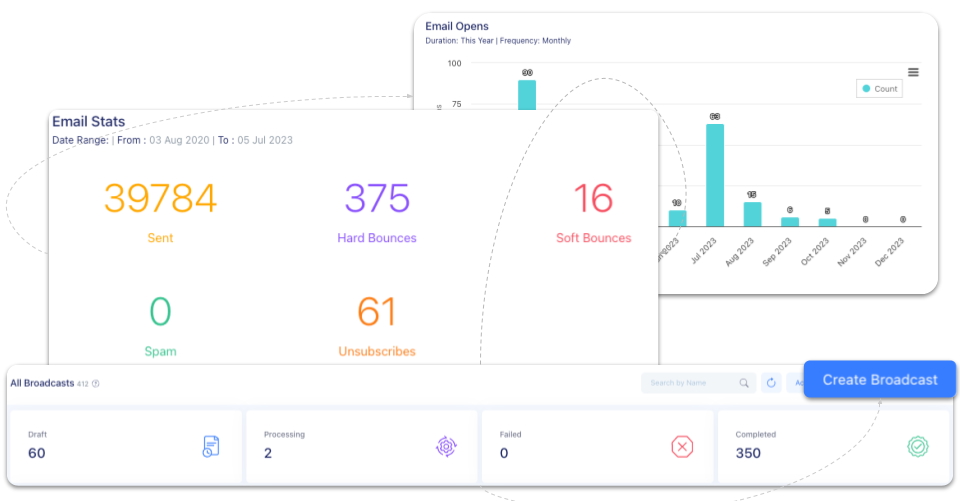
Businesses are changing the game with email automation, and AI is making it even more powerful! AI-enabled email automation programs analyze data and improve campaigns using machine learning algorithms to deliver personalized content to each recipient.
These solutions automate tedious tasks and provide insights into customer behavior, helping businesses save time and money. AI-powered email automation can enhance email marketing strategies, boost lead generation, and improve client retention, ultimately increasing revenue.
Email marketing automation tools such as EngageBay, Customer.io, RafflePress, Sendinblue, MailChimp, Constant Contact, and ActiveCampaign have taken the marketing arena by storm. They’ve provided companies with substantially higher ROIs and email engagements by segmenting audiences, personalizing emails, and optimizing send times.
Read also: How to Implement AI in Email Marketing
Social media management
Social media management software enhances consistency and efficiency by automating scheduling and posting, tracking previous and upcoming posts, and providing key performance and audience metrics.
With AI, you can use this software to generate ideas, text, and graphics for your posts, analyze large datasets to gauge audience sentiment and use machine learning to predict performance before publishing. This ensures your social media strategy is data-driven and optimized for success.
Platforms such as HootSuite, FeedHive, Buffer, Flick, Ocoya, and Vista Social are top-performing social media management tools that help schedule posts, analyze engagement, and identify trends.
SEO and content optimization
To produce high-ranking, search-friendly content, AI-powered SEO optimization tools help locate and incorporate relevant keywords, enhance readability, emphasize quality, update metadata, and create links to both internal and external sources.
The most crucial aspect of these AI-backed content optimization tools is their use of advanced natural language processing models and proprietary technology. This allows them to offer suggestions on effectively differentiating your content in search results.
Clearscope, Dashword, SurferSEO, Semrush, SE Ranking, Letterdrop, and RankIQ are some of the finest SEO and content optimization tools that use AI to analyze search trends, optimize content, and improve search rankings.
Customer relationship management (CRM)
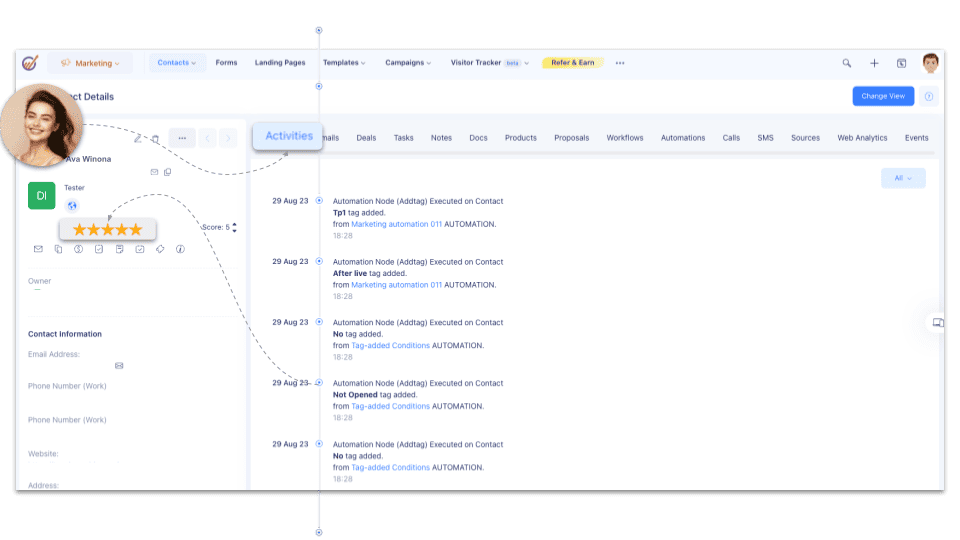
AI-powered CRMs have revolutionized customer relationship management in the past decade. Their advanced algorithms excel at predicting customer behavior, segmenting audiences, and personalizing communication.
These AI-backed CRMs analyze vast amounts of data, including past interactions, purchase history, and demographic information.
When used effectively, these tools can help you easily anticipate customer needs and preferences, leading to more personalized and effective customer interactions.
Leading AI-driven CRMs such as EngageBay, Salesforce Einstein, Zoho CRM, HubSpot CRM, Microsoft Dynamics 365, and Pipedrive bring machine learning algorithms into use. This is done to optimize sales processes, prioritize leads, and forecast sales trends.
These platforms make sure that businesses build stronger relationships with their customers. Ultimately, you can drive revenue growth through personalized engagement strategies.
Read also: 12 Best AI Copywriting Tools to Save You Hours Everyday
How to Choose the Right AI Marketing Tools for Your Business
There is no one-size-fits-all answer when choosing AI marketing tools for your business. However, consider these general factors when making your selection.
Business size
First and foremost, consider the scale of your operations. For small businesses, prioritize cost-effectiveness and ease of use.
However, for larger enterprises, the requirements are more complex. They need sophisticated tools to manage intricate campaigns and larger datasets.
Evaluate the scalability of the AI tool you choose. Can it accommodate your business’s growth and evolving needs over time? Will the AI tool expand with your company, adapt to large data sets, and provide the best value for your investment?
Answering these questions will help you select the AI marketing tool that best contributes to your overall business goals.
Marketing goals
When considering marketing goals, it’s crucial to clearly understand what you want to achieve and how you’ll measure success.
Define your marketing objectives and identify key performance indicators (KPIs) to track progress.
For example, if your marketing objective is to increase website traffic, your KPIs could include website visits, page views, bounce rate, and average session duration.
These metrics serve as benchmarks to assess the effectiveness of your marketing efforts in driving traffic to your website. Once you’ve established your marketing goals and KPIs, search for AI tools with features and capabilities aligned with those objectives.
For instance, if you aim to increase website traffic, prioritize AI tools with robust SEO optimization or content generation capabilities.
SEO optimization tools can improve your website’s visibility in search engine results, driving organic traffic. Similarly, content generation tools can help create engaging and relevant content that attracts visitors to your website.
These tools may utilize AI algorithms to generate blog posts, articles, social media posts, or other types of content tailored to your target audience’s interests and preferences.
Budget
Understanding your budget constraints is crucial when selecting AI marketing tools.
Assess initial and ongoing expenses, including subscription fees, implementation costs, and charges for additional premium features or support services.
Consider each tool’s potential return on investment (ROI) to ensure it aligns with your budgetary constraints.
Prioritize tools that offer the best value for your investment and provide scalable pricing options as your business grows.
By carefully evaluating the costs and benefits of each AI tool, you can make informed decisions that maximize your marketing budget and drive sustainable growth.
Technical expertise required
Assessing your team’s technical expertise is vital when choosing AI marketing tools. Consider the proficiency level and familiarity with AI technologies among your team members.
Evaluate whether additional training or resources will be required to implement and utilize the chosen tools effectively.
Look for platforms with user-friendly interfaces, comprehensive documentation, and responsive customer support to facilitate easy use and troubleshooting.
Additionally, consider the compatibility of the AI tool with your existing infrastructure, software, and workflows to minimize integration challenges.
By selecting tools that match your team’s skill level and offer adequate support, you can successfully implement and utilize AI marketing technologies.
Read also: What is an AI Email Writer? 8 of the Best AI Email Writers
Tips for Evaluating AI Marketing Tools
When evaluating marketing automation tools, it’s essential to consider several key factors to ensure you choose the right solution for your business needs.
Here are some tips for effectively evaluating AI marketing tools.
Features
Evaluate if the AI marketing tool offers comprehensive features aligned with your marketing goals, such as content generation, customer segmentation, predictive analytics, and campaign optimization.
Integration capabilities
Ensure the AI tool integrates seamlessly with your existing marketing platforms and social media channels for efficient data flow and collaboration.
Ease of use
Consider the tool’s usability, user interface, and workflow to ensure it is intuitive and easy to navigate. This minimizes training time and maximizes productivity for your team members.
Support
Look for vendors that provide responsive customer support, comprehensive documentation, training resources, and a vibrant user community to assist with implementation, troubleshooting, and ongoing support.
By carefully evaluating the features, integration capabilities, ease of use, and support options of AI marketing tools, you can make informed decisions that align with your business objectives and maximize the effectiveness of your marketing efforts.
Additionally, consider conducting trials or demos of potential tools to test their functionality and suitability for your specific needs before making a final decision.
Examples of AI Marketing Tools in Action
Now that we’ve discussed key factors for evaluating AI marketing tools, let’s explore some examples of how these tools are utilized in real-world scenarios:
How Cosabella used AI for ad creation
Cosabella achieved significant success by integrating AI into its marketing operations.
As social media and advertising are crucial marketing components, Cosabella decided to hand over its sponsored search and digital marketing efforts to an AI algorithm called Albert. This decision came after the company’s marketing communications with its agency became laborious and time-consuming.
Despite concerns about AI taking over, Cosabella saw impressive results. With Albert in charge of their marketing, they experienced a 50% rise in return on ad spend for search and social media, along with a 12% reduction in ad expenditure.
How Netflix employs AI for personalized recommendations
Netflix’s marketing is renowned, but what truly stands out is how it uses AI to personalize content recommendations.
How do they accomplish this?
By leveraging data on what content users watch and how they engage with the service, Netflix improves its ability to predict each user’s next great film or television series.
The AI gathers information and makes tailored recommendations for TV series, films, and artwork based on individual preferences.
Netflix’s recommendation system generates over $1 billion in revenue annually, primarily from its customized grid of suggestions based on user preferences.
How FARFETCH got AI to boost its brand voice
FARFETCH aims to customize its messaging for millions of consumers. They shook hands using Phrasee, a tool that tests new styles, tones, words, and phrases to find the language most effectively connects with its audience.
This process produces on-brand content with enterprise-grade controls and optimization at scale. They made an effort to apply this tactic to their email marketing initiatives.
FARFETCH witnessed remarkable results from granting Phrasee the ability to oversee its email marketing content, with an average click rate and open rate jump of 38% and 31%, respectively, in its trigger campaigns.
The company also successfully established and maintained a distinct brand voice.
These case studies gave you a peek into how these leading businesses have used AI to provide better customer service. However, things may be different for your small business.
Implementing AI marketing tools can present several challenges for small businesses.
One common hurdle is the initial investment required, as acquiring and integrating AI technology may involve significant upfront costs.
Additionally, ensuring compatibility with existing systems and workflows can be complex, requiring careful planning and technical expertise.
Furthermore, team members may resist or hesitate to adopt AI-driven processes, necessitating thorough training and change management efforts.
Despite these challenges, overcoming them can lead to substantial benefits, including improved efficiency, enhanced insights, and competitive advantage in the market.
Conclusion
AI marketing tools hold immense potential for small businesses, offering streamlined operations and invaluable insights. Small business owners are encouraged to explore these tools to elevate their marketing strategies and achieve superior results.
With AI integration, businesses can optimize efficiency, gain a competitive advantage, and thrive in the ever-evolving marketplace.
EngageBay is an all-in-one marketing, sales, and customer support software for small businesses, startups, and solopreneurs. You get email marketing, marketing automation, landing page and email templates, segmentation and personalization, sales pipelines, live chat, and more.
Sign up for free with EngageBay or book a demo with our experts.
Frequently Asked Questions (FAQ)
1. What are AI marketing tools, and how do they work?
An application that uses artificial intelligence and machine learning to improve the way marketing activities and workflows are carried out is called an AI marketing tool. AI uses machine learning and data analysis algorithms to make predictions based on presented data. This makes it ideal to use these tools in marketing endeavors.
2. How can AI marketing tools improve my business’s marketing efforts?
AI marketing tools can improve your business’s marketing efforts by:
- Increasing your return on investment.
- Giving you speed and efficiency.
- Enabling you to provide a better customer experience.
- Data-based marketing decisions.
3. Are AI marketing tools expensive?
A pre-built chatbot purchased from a third party may cost your business up to $40,000 annually. Free chatbot apps may occasionally be available for your company to satisfy your bot marketing requirements; however, these are mostly useful for startup businesses.
4. Can AI marketing tools replace my marketing team?
No. AI Marketing tools can never replace marketers since marketing involves communication from human to human. Artificial intelligence can only work on pre-governed data, requiring human intervention at every stage.
5. How do I integrate AI marketing tools with my existing marketing strategies?
You can integrate AI in content creation, data analysis, understanding research terms, preparing content calendars, reducing admin work, content personalization, and more.
6. What are some common AI marketing tools used by small businesses?
Some common AI marketing tools small businesses use are Jasper, SurferSEO, Phrasee Ltd., Seventh Sense, and Grammarly.
7. How can I measure the success of AI marketing tools?
Examine key performance indicators (KPIs), including AI models’ accuracy, efficiency, and scalability, to gauge the effectiveness of your team’s AI efforts. Analyze adoption rates, comments, and user satisfaction. Monitor how it affects the capacity to accomplish project deadlines, cost-effectiveness, and business objectives.
8. Can AI marketing tools help with customer retention?
Yes. For further parts of client retention, such as customer feedback research, where you may better understand what is likely to keep each user engaged with the D2C brand by analyzing customer feedback, artificial intelligence (AI) is a great tool.
9. How do I choose the right AI marketing tool for my business?
Consider factors such as your company’s business size, budget, marketing goals, and whether your team has the technical expertise to use those tools.
10. What are the potential risks of using AI marketing tools?
Risks include worries about algorithmic bias, privacy invasions, autonomous weapon systems, and the replacement of human labor. Extensive ethical frameworks and regulatory control are necessary to lessen the possible harm these risks may cause to society.
